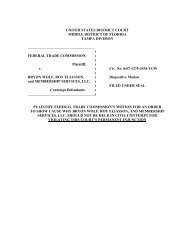Complaint Counsel's Post Trial Brief - Federal Trade Commission
Complaint Counsel's Post Trial Brief - Federal Trade Commission
Complaint Counsel's Post Trial Brief - Federal Trade Commission
Create successful ePaper yourself
Turn your PDF publications into a flip-book with our unique Google optimized e-Paper software.
unsubstantiated because Respondents lacked a reasonable basis for asserting that the<br />
claim was tre. FTC v. Pantron I Corp., 33 F.3d 1088, 1096 (9th Cir. 1994); FTC v.<br />
Sabal, 32 F. Supp. 2d 1004, 1007 (N.D. TIL 1998). Proof of intent to deceive is not<br />
required, and ''the subjective good faith of the advertiser is not a valid defense to an<br />
enforcement action brought under section 5(a)." Sabal, 32 F. at 1007; see also FTC v.<br />
World Travel Vacation Brokers, Inc., 861 F.2d 1020, 1029 (7th Cir. 1988).<br />
16. The "reasonable basis" test is an objective standard. Advertisers must possess at least the<br />
level of substantiation expressly or impliedly claimed in the advertisement. See<br />
Honeyell, Inc., 126 F.T.C. 202 (1998); FTC v. Natural Solution, Inc., No. CV 06-6112<br />
JFW, 2007 U.S. Dist. LEXIS 60783, at *10 (C.D. Cal. Aug. 7, 2007) (citing FTC v. US.<br />
Sales Corp., 785 F. Supp. 737, 748 (N.D. TIL 1992)).<br />
proving that Respondents' purorted substantiation is<br />
inadequate, but is not requied to conduct or present clincal studies showing that the<br />
products do not perorm as claied. See FTC v. QT, Inc., 448 F. Supp. 2d 908, 959<br />
(N.D. TIL 2006) afd 512 F.3d 858 (7th Cir. 2008), (citing Sabal, 32 F. Supp. 2d at 1008<br />
09).<br />
17. The Commssion has the burden of<br />
18. For health and safety clais, adverisers must possess "competent and reliable scientific<br />
evidence" substantiating their clais in order to have a "reasonable basis" for such<br />
claims. See FTC v. National Urological Group, Inc., No.1 :04-CV-3294-CAP, 2008 U.S.<br />
Dist. LEXIS 44145, at *77 (N.D. Ga. June 4,2008) (granting the FTC's motion for<br />
sumar judgment and fiding that since all of defendants' "claims regard the safety and<br />
effcacy of dietar supplements; () they must be substantiated with competent and<br />
reliable scientific evidence"); Natural Solution, 2007 U.S. Dist. LEXIS 60783, at * 11-13<br />
(granting the FTC's motion for sumar judgment and applyig the "competent and<br />
reliable scientific evidence" standard to defendants' clais that their product prevents<br />
and treats cancer); FTC v. QT, Inc., 448 F. Supp. at 961 ("Reasonable basis" required<br />
defendants to have "competent and reliable scientific evidence" when they made the<br />
claim that the Q-Ray bracelet provides imediate, signficant, or complete pain relief).<br />
19. "Competent and reliable scientific evidence" is tyically defied as ''tests, analyses,<br />
research, studies, or other evidence based on the experise of professionals in the relevant<br />
area, that has been conducted and evaluated in an objective maner by persons qualified<br />
to do so, using procedures generally accepted in the profession to yield accurate and<br />
reliable results." See, e.g., Brake Guard Products, Inc., 125 F.T.C. 138 (1998); ABS Tech<br />
Sciences, Inc., 126 F.T.C. 229 (1998).<br />
20. Cours have consistently found or upheld that double-blind, placebo-controlled studies<br />
are required to provide adequate substantiation for the trthfuness of varous health-<br />
related effcacy clais. See, e.g., FTC v. SlimAmerica, Inc., 77 F.Supp. 2d 1263, 1274<br />
the defendants' product claims requires a<br />
(S.D. Fla. 1999) ("Scientific validation of<br />
double blind study of the combination of ingredients used in (the product formula).");<br />
Sabal, 32 F.Supp. 2d at 1008-09 (rejecting study as valid substantiation, in par, because<br />
43

















